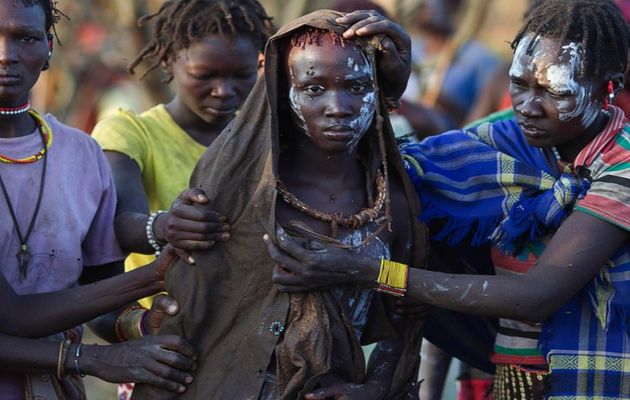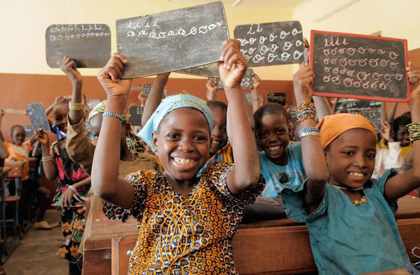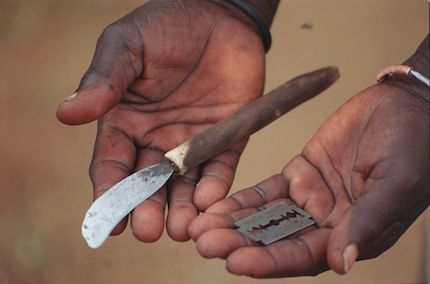February 6th, International Day of Zero Tolerance for Female Genital Mutilation. World Vision says “Education is the key”. Read the interview.
 A girl after suffering FMG. / Siegfried Modola, Reuters
A girl after suffering FMG. / Siegfried Modola, Reuters
It is estimated that 125 million girls have suffered female genital mutilation, and 3 million more girls suffer this ritual every year.
Every 6 minutes, a girl is genitally mutilated. Today, February 6th, is International Day of Zero Tolerance for Female Genital Mutilation. Join the conversation on social networks with the hashtag #EndFGM
Daniel Hofkamp has spoken to Susana Oliver, Project manager of World Vision in Spain.
Q. Why does Female Genital Mutilation (FGM) exist?
A. The main reason is control over women’s sexuality, to ensure virginity before marriage, and to make sure that the girl is docile and she can bear the pain. Many societies believe that if a girl can endure the mutilation pain, she will also be able to endure the pain of pregnancy, which is her main role, the role of giving birth.
Q. Are there religious reasons?
A. Mutilation started more than 4,000 years ago, so it predates most of the monotheistic religions we know today. But sometimes we can find people in other religions, sometimes Muslims, sometimes Catholics, who practice this ritual in countries with different beliefs, animists. We have met people who told us that they have suffered FGM because it is in the Bible or in the Koran. None of this is true.
There are illiterate people who believe everything their religious leaders tell them, and these leaders, because of tradition, ignorance or a desire to control women’s sexuality, use those religious arguments, but we cannot say that the FGM is related to any religion.
 Girls in a school in Mali. / World Vision.
Girls in a school in Mali. / World Vision. Q. What are the places where FGM is most common?
A. The mutilation is most common in sub-Saharan Africa. From Ghana and Mali, throughout the Sahara strip, until Saudi Arabia. Because of the immigration movements, this ritual has spread, and we can even find it in Europe.
Q. We have read recently that people who live in Spain travel to their own countries to have their daughters mutilated. Is it true?
A. That is a problem in many communities. In the region of Catalonia, they wrote a protocol to try to prevent this problem. They work with schools, medical centres and the police. If it is not possible to prevent it, it is necessary to ban the departure of these families, because we do not want that this girl, who is a Spanish citizen, to suffer mutilation.
Education is the key. One colleague from One Vision Kenya told us that she was saved from mutilation because her teacher explained to her that she had the right to maintain her integrity, and she could oppose the mutilation her parents wanted for her. That girl had to escape from her house to avoid FGM, however.
It is very important to talk about the physical and psychological consequences of FGM, and the fact that physical integrity is a right of every human being.
Q. What are the physical consequences of the FGM?
A. Sometimes we only see the short-term consequences. Mutilation is not carried out in a hospital, but in very bad conditions, without any hygiene, with a blade, or even with just a piece of glass sometimes.
That causes infections, haemorrhages, those are the immediate consequences. But the cut is in a zone where everything is together, and the vagina, the urethra and the anus can be affected, they can have fistulas or pregnancy problems in the future, even the death of the baby.
 Mutilation is not practiced in a hospital, but in very bad conditions, without any hygiene, with a blade, or even with just a piece of glass sometimes, says Susana Oliver.
Mutilation is not practiced in a hospital, but in very bad conditions, without any hygiene, with a blade, or even with just a piece of glass sometimes, says Susana Oliver.Q. And the social and psychological consequences?
A. The mutilation ritual usually occurs as part of the initiation into adulthood, with the first menstruation, or when the girl is getting married. The ritual is a celebration with all women in the community. The girl does not know that her mother or grandmother will bring her to a big pain during that party. There is fear, insecurity, besides the physical pain, so the consequences are tremendous.
Q. How does your association work?
A. One of the most difficult places is Mali, because 98% of women there suffered FGM. It is so rooted and normal there, so it is very difficult to fight against it.
We work in schools and hospitals, because many people are not aware of the long-term consequences of mutilation. We also work with men, so that they get involved in this cause, they understand the important of the fight against FGM.
We work with the midwives too, everybody respects them, and they are the ones who carry out the mutilations for a living. We work with them, so that they can understand the horrible consequences of mutilation, and we also try to provide them with an alternative way of living.
It is a long term job. The advantage is that we have committed to work with them for 15 years. We are building schools, wells; we are helping with other health problems, not just FGM. They see that we help them in many different things, and that lets us talk about taboo topics and getting the community commitment of working with us against mutilation.
In Mali, we have received the testimony of a mayor who told us that he wanted to fight against FGM, but he has not done it yet, because he feels alone. Seeing that World Vision was fighting too gives him the strength to start fighting.
Q. How can Christian values be part of the fight against this practice, so rooted in the culture?
A. For us it is vital that the people of the communities where we work know that we have values, the fact that faith is very important for us. In Mali our work is more interdenominational, because most of them are Muslims, and our job is to find the common values between the Muslim and Christian faiths and to fight against FGM through them.
Female genital mutilation (FGM) is estimated to affect up to 680,000 women and girls in Europe, including both women who have suffered and girls in risk.

Las opiniones vertidas por nuestros colaboradores se realizan a nivel personal, pudiendo coincidir o no con la postura de la dirección de Protestante Digital.
Si quieres comentar o